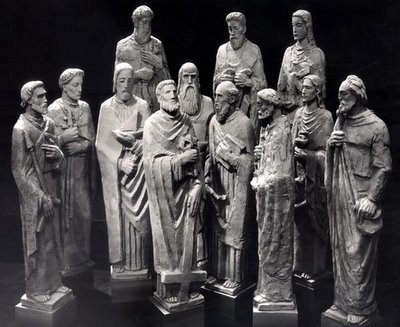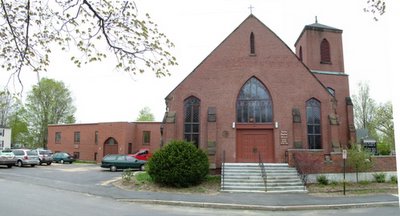
As eyes turn to the General Board meeting (Nov. 17-20) which will take up the now famous (infamous, depending on where you stand) Indiana-Kentucky Petition, here’s helpful background material from the IN-KY ABC website.
The IN-KY Board meets this Saturday.
FREQUENTLY ASKED QUESTIONSFROM LISTENING AND INFORMATION MEETINGS
July 19-August 2, 2005
Can you give a synopsis of the petition (approved by the ABC/IN-KY Board and receive by the General Board of ABCUSA)?
The petition, which can be found on the region’s website at www.abc-indiana.org, was received by the ABCUSA’s General Board in June, 2005. The petition is requesting three changes to the ABCUSA Standing Rules and bylaws.It reads:"To amend the document entitled "We are American Baptists" by adding the following statement to the section: "We are a Biblical people." The addition would read, "We submit to the teaching of Scripture that God’s intended design for sexual intimacy places it within the context of marriage between one man and one woman, and acknowledge that the practice of homosexuality is incompatible with Christian teaching.""To amend the standing rules so that regions would be allowed to receive as ABC/USA cooperating churches only those churches within their geographical boundaries or with approval of contiguous regions, receive churches located within those contiguous regions.""To amend the standing rules so that a church dismissed by a region could only gain re-entry in the ABC/USA through the region from which it was dismissed."The petition will be received for a second reading at the ABCUSA General Board meeting November 17-20, 2005, and a vote will be taken at that time.
Have we received a copy of the petition?
A copy of the petition was sent to all of the region’s Professional Church Leaders on November 17, 2004. A copy of that letter can be found on the region’s website at www.abc-indiana.org.
If the vote by the General Board (in November, 2005) is positive, is it then a smooth road toward the bylaw changes?
No, but it is a required first step. Each change requested in the petition must move through a different process due to the structure of ABCUSA.Change one (amending "We Are American Baptists") requires only a majority vote of the General Board, but to incorporate the amendment into the Common Criteria (the document of requirements for a cooperating congregations within the ABCUSA) requires the proposed change to go before the board of each region and must be approved by three-quarters of these boards. If accomplished, the General Board acts on a "confirming resolution to incorporate the revised Common Criteria into the Standing Rules." The initial vote of the General Board will be taken in November of this year. Regions would probably be required to vote on the change before the June, 2006, meeting of the General Board. Then, the change could be voted on and become official at the June, 2006, meeting.Change two (regarding the decision by a Region to receive a cooperating church), if approved by the General Board in November, 2005, would still require a change be made to Article V of the ABC/USA bylaws, as well as changes in the denomination’s Covenant of Relationships. The earliest this could be fully approved is at the June, 2007, Biennial meeting of ABCUSA in Washington D.C.Change three could also move in several directions, but an acceptance by the General Board in November, 2005, would require a change be made to Article V. Section 2 of the ABC/USA Bylaws as well as a change to the denomination’s Covenant of Relationships. This could not be completed until delegates of the ABC/USA meet again for business, which is not until the 2007 Biennial in Washington D.C.David Knipel, legal council for ABCUSA assures us that the requested changes outlined by the petition are all possible and could be accomplished within the timeframe stated above.
Are you focusing on marriage? What is the ABC stance on same sex marriage?
As you read the petition you can see that our first statement is a statement on marriage stating, "We submit to the teaching of Scripture that God’s intended design for sexual intimacy places it within the context of marriage between one man and one woman, …" The first point of this petition speaks to sexual intimacy, marriage and the practice of homosexuality.
Where does Roy Medley stand on this issue?
Dr. Medley’s Biennial address is on ABCUSA’s website and he speaks directly to this issue. It would be best if you would go to that site and read the address first hand.
Can you offer insight as to why the General Board and the General Secretary are reluctant to support the majority of churches?
I am not sure that the General Secretary believes that a majority of churches support the stand taken by IN-KY. He has said that there are 20% of American Baptists who would agree with the petition and 20% who would strongly disagree; the other 60% are somewhere in the middle. There are many who are members of the General Board who support the petition, and we shall see in November, as the vote on the petition is taken, what percentage of the board does support the petition.American Baptist Churches USA have often lifted up the fact that we are the most diverse of all mainline denominations. As of this date there is no racial or ethnic group who holds a majority of membership. It seems that the denomination’s pride in diversity, originally referring to racial and ethnic diversity, now includes sexual orientation. To maintain unity in our diversity, ABCUSA is reluctant to take a strong stand on this issue.
Do we believe this (the homosexual issue) is God’s number one item?
This issue is not God’s number one item. We are clearly led through Scripture that our number one item is that of the Great Commission (Matthew 28:18-20). This issue, however, is currently dominating much of ABC life. The result is that we are unable to work together toward common visions, goals, and ministry. Even so God has been good and there is much good that continues as local congregations, regions and ABCUSA continue to minister and serve in ways that bring the Good News of Jesus Christ to many. Over the last nine years three different consultants to our national denomination have told us that if we are to reach our God given potential this issue of homosexuality must be confronted directly and an understanding of what we believe as American Baptists must be addressed.
What is the next issue on the list? What about other sins?
American Baptist history tells us that about every 40 years an issue comes forward and creates conflict for the denomination, and often ends with a number of individuals and churches leaving the denomination. It would seem this is the issue of today because it is the issue that society has pushed forward. Are there other sins? Yes, certainly, and those sins should be addressed.A second reason the issue of homosexuality is being brought forward at this time is that it is the issue that is dividing our denomination and distracting us from the primary purpose of the Great Commission.
Are there risks of an SBC fundamentalist like movement within the ABC?
Of course there is a risk, but that is not what is being addressed through IN-KY’s petition to the General Board.
Can you help us understand how local church autonomy fits into this issue?
"A Baptist Manual of Polity and Practice," a book by Norman Maring and Winthrop Hudson that has been used as on of the definitive books to describe who Baptist are and what they believe says this about local church autonomy:"For some people, the most prized doctrine of Baptists is ‘the autonomy of the local church.’ The notion of absolute independence of a local church, however, was foreign to the thinking of early Baptists. They adopted the congregational principle because they believed it would afford the possibility of fuller obedience to God, who is the only Lord of conscience. Especially in local affairs, such as the admission and exclusion of members and the choosing of a pastor, they needed to be free to seek and follow the will of the Lord. This right to ‘church power’ represented a degree of independence, but it was balanced by a strong sense of interdependence among congregations. Baptists recognized an obligation to maintain a wider fellowship within which they would give assistance, accept counsel, and work toward common ends. Today there is a widespread misconception of the ‘independent local church’ strand of Baptist ideology. In its original form it is essential to the Baptist genius, but the present-day idea of ‘absolute independence’ creates misunderstanding and fosters anarchy. It ignores the important values which are grounded in the associational principle," (pp. 8-9)
What is the meaning of the various ABC covenants? What are the ramifications if the covenants are broken?
The American Baptist Church USA consists of Boards (International Ministries, National Ministries, Ministers and Missionaries Benefit Board and Office of the General Secretary) and over thirty regions. All of these are legally independent of one another, and because of that, autonomous in their structure. In seeking a common understanding of how these separate organizations would work and minister together, covenants of relationship were developed and accepted by each of the parties.In recent months the American Baptist Churches of the Pacific Southwest indicated that they were considering withdrawing from one of the covenants but remaining part of the national denomination. They received a letter from Dr. Roy Medley, ABCUSA’s General Secretary (which was copied to all region executives) which stated that if a covenanting partner broke or withdrew from one of these covenants of relationship, they withdrew from them all. Meaning that once a region or board enters into a covenant of relationship with the national body all covenants must be maintained or it would be assumed that all covenantal agreements were broken. Therefore, if Indiana and Kentucky chose to withdraw from any of the covenants in which they are now entered with other regions and boards, it would be considered that we withdrew from all. In effect this would mean that we were no longer American Baptists.
What does the term "Welcoming and Affirming" really mean?
Members of the Association of Welcoming & Affirming Baptists (AWAB) are churches, organizations, and individuals who are willing to go on record as welcoming and affirming all persons without regard to sexual orientation or gender identity, and who have joined together to advocate for the full inclusion of lesbian, gay, bisexual and transgender persons within Baptist communities of faith. At last count there are about 51 ABC congregations who have membership, many of which are dually aligned with other denominations. You can learn more about Welcoming and Affirming congregations at http://www.wabaptists.org/. The Association of Welcoming and Affirming Baptists is NOT an official organization recognized by the ABCUSA.
What if the homosexual doesn’t have a choice?
Our assumption has been that people choose this lifestyle, but we don’t really know.There does seem to be research that indicates this it is possible that some individuals are born with a tendency toward a homosexual lifestyle. There are other researchers who will state the opposite. As of this date I do not know of any study that scientifically proves that either is true. Our region’s policy on homosexuality states that "practicing homosexuality" is sinful, just as "practicing alcoholics" find themselves in a sinful lifestyle. There is strong research that states that alcoholism (and even such behaviors as extreme anger) can be traced to a physical understanding. We also know that alcoholics will never cease to be alcoholics, but they can abstain from alcohol.
When you talk about homosexuals and church leadership what kind of leadership are you talking about? Pastoral leadership?
The Resolution on Homosexuality passed by delegates at an annual meeting at Lawrenceburg in 1980 continues to be what guides us at the region level. This resolution states that the region will not ordain or recognize the ordination of practicing homosexuals. Local congregations are autonomous and must make these decisions for themselves. However, it should be noted that when a local congregation did choose to ordain a man who was a practicing homosexual, the association in which that church resided disfellowshipped the church from its membership and the region board removed the church from its rolls as well.
Is there language in the petition or in other documents relating to mission money and homosexual groups?
There is no language in the petition that speaks to mission money at all. As long as we are members of American Baptist Churches USA we are committed to the Common Budget Covenant, which is a document that explains the percentages of United Mission Giving that is sent to various mission agencies and auxiliary organizations within the denomination. None of these mission agencies or auxiliary organizations is a "homosexual group." Local congregations can specify where their mission support is distributed however. If you have questions as to how this is done you should contact Dr. Donald Scott, Associate Executive Minister, at the region office.
If the denomination changes drastically, what might happen to International Ministries and the seminaries?
American Baptist related seminaries and colleges receive their funding from individual donors, congregations and other means of support separate for the national denomination. The national denomination does not fund these institutions.International Ministries does receive a percentage of the United Mission funding; however their primary funding comes through the World Mission Offering and gifts specified from individuals and local congregations. If major changes did occur within the denominational structure, International Ministries could continue to be funded through the direct giving of individuals and local congregations.
If the petition is not accepted and our region separates from ABCUSA, what happens to the region’s assets?
Nothing. The region is separate and autonomous from the national arm of denomination, which means that our assets would remain in control of the region board.
Would separating from the ABCUSA affect our camps?
Separating from the ABCUSA would not affect our camps in any way.What does the term "American Baptist Evangelicals" really mean?
The American Baptist Evangelicals were formed in 1992 to engage in an ongoing task of affirming the positive aspects of renewal within the ABC-USA as well as identifying the needs and problems of the denomination; and to work as American Baptists to solve creatively these issues; and to suggest positive directions appropriate to the local, regional, or national setting. Currently there are over 500 congregations and individuals who are members of the ABE. You can learn more about American Baptist Evangelicals at www.abeonline.org. American Baptist Evangelicals are NOT an official organization recognized by the ABCUSA. It should be noted that ABE is holding a national meeting at Northern Baptist Seminary in Chicago, IL on September 23-24, 2005.
Are there churches in our region who disagree with the Indiana-Kentucky statement?
As you might expect there are churches in our region who do not agree with the petition submitted by the region board.
Do all IN-KY General Board members support the petition?
No, they do not.
Were those who object to the petition reminded of what the Bible says?
The issue of Biblical authority has been instrumental in all communication surrounding the issue of homosexuality. Again, you should look at our website to view the motion for the petition as it was given before the General Board.
What are the percentages of churches that feel one way or the other? Are those supporting a stronger stance on the issue of homosexuality in the minority?
It is very difficult to give a clear answer to this question as there has not been asurvey to ask this question. From the comments of those attending the Listening and Information sessions within this region, it would seem that a strong majority would agree with the development of a stronger and clearer stance on this issue. We realize that there are also individuals who would disagree. There are also several of the larger regions who have clearly defined their support of our petition and the desire for a stronger national stance around this issue. There are also regions who would not agree.
Do we have a real feel for Indiana’s stance on the homosexual issue?
If 2/3 of our churches did not respond to the petition, we cannot make a difference.When local congregations are asked to respond to any material sent out, from church reports to training events, the response is always low. Many of the congregations within this region are working hard to stay focused on the ministry to which they believe God has called them and do not become involved in issues that they feel will take them in another direction. Other congregations contacted the region office to let us know that they could support part of the petition but they could not support it in full, Normally, areas of disagreement centered on points two and three of the petition. I have had several calls from congregations who stated that they never received the letter with the petition. And, there were those congregations who did not agree with the board’s action at all. Even so, to have 1/3 of the congregations within the ABC of Indiana and Kentucky study the request, take it before their church, and send a letter of support to the region, is a very strong statement of support. If 100 Christians (or 111 Indiana and Kentucky churches) set their mind with that of God’s, change can happen.
Do you view the General Board vote in November as a watershed event?
There is no single event that could be considered "the watershed event" in relation to this issue, though the General Board vote is very important. Other dates and events that will be watched closely are listed on our website.
What is the timetable? How long is long enough before some definitive action is taken?
There is no absolute timetable. Several events will influence future actions: The petition which began through our region board will have its second reading and vote in November of this year. Your region board will be receiving recommendations from the presidential task force at their November meeting concerning our relationship with the ABCUSA. Meetings with other regions and organizations inside and outside our denominational structure are going on and we do not know what they may produce at this time. Individuals and churches throughout the world are in prayer for God’s intervention for our denomination. Change in structure, and certainly change in direction, do not happen quickly and without great energy. This is not a time to set deadlines, rather a time to seek the will and wish of God.
Are there contingency plans for the future if change does not occur? What do we do as a region if the General Board votes against the Indiana-Kentucky petition? Do we stay with the ABC and go on as usual? Do we fight? Do we change our relationship with ABC?
Mrs. Connie Tingle, our region president, appointed a Presidential Task Force at the board’s meeting in July of this year. The purpose of the Task Force is to bring recommendations back to the region board in November 2005 that would address the ABC of Indiana and Kentucky’s relationship with the national denomination. That Task Force has met twice and is making good progress. Until that report is submitted and reviewed by the region board there are no formal contingency plans for our future. It continues to be our prayer that change will occur in the ABCUSA and there will not be a need to talk about such things as contingency plans.
What steps can my church take that will help (address the issue)? Does it help for churches and association to take action?
It is most important that you commit to pray. Whatever is done, whatever direction the denomination (including this region and your local congregation) moves in the years ahead must be led by God alone, and that means lots of prayer. A congregation can also let the region office, region board members and especially the region’s General Board Representatives know of your beliefs and desires for our region and denomination as a whole. Finally you can contact the General Secretary, Dr. Roy Medley, ABCUSA’s President, Mrs. Betty Johnson, or others within our national leadership. Region contacts may be found through our website (www.abc-indiana.org) and national contacts may be found at ABCUSA’s website (http://www.abc-usa.org/ .)
Can you give more information on the Great Commission Network?The best way for you to learn about the Great Commission Network is to go to their website. The region board will be asked to consider becoming a member at their November 2005 meeting. If that is approved you will be hearing a lot more about GCN.
How can we help a practicing homosexual turn his/her life around?
We must show love and grace. The Indiana-Kentucky petition and resolution seem to require that those who would approve of them (the petition and resolution) show clear and open love so that there can be no question that they come from the heart of God. Loving others as Christ loved must come first. If that is not present then nothing can be done.It is also important that you do your best to understand what it means to be homosexual. We cannot talk to or help anyone without some knowledge of their situation.Finally there are organizations and groups that can help congregations develop programs and support groups for persons seeking to change their lives.
Source:
http://www.abc-indiana.org/FAQs%20From%20Listening%20Sessions.htm








